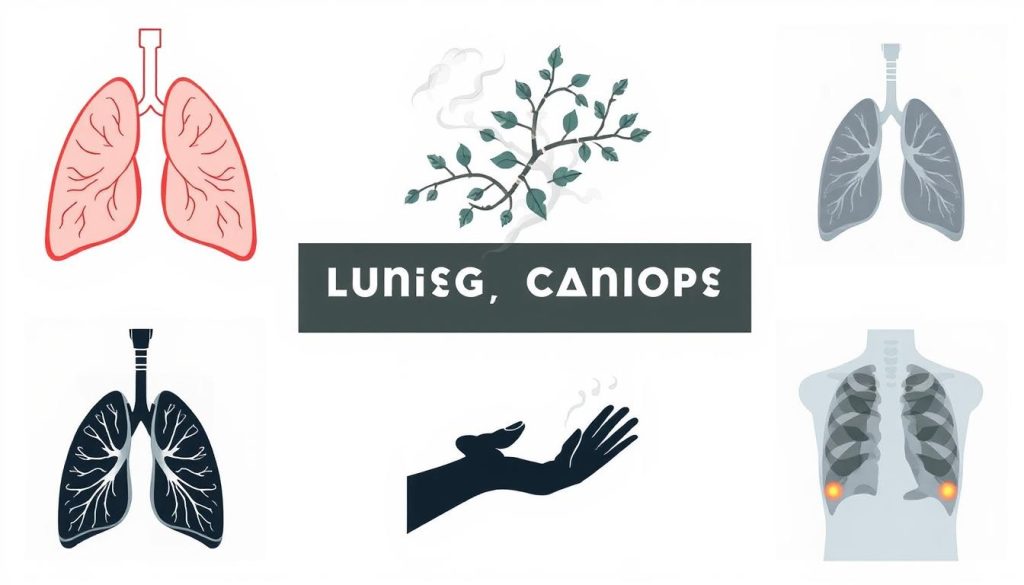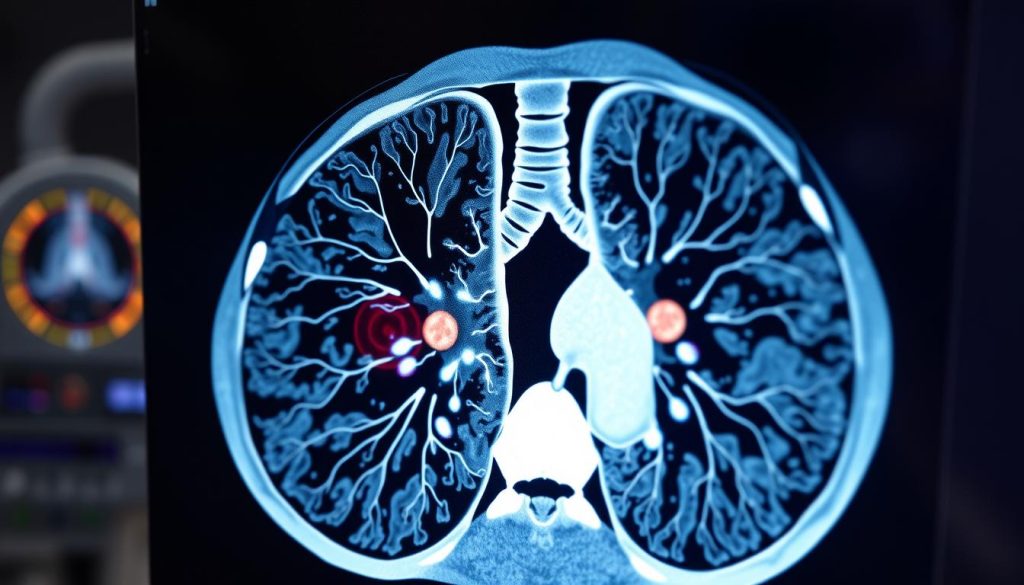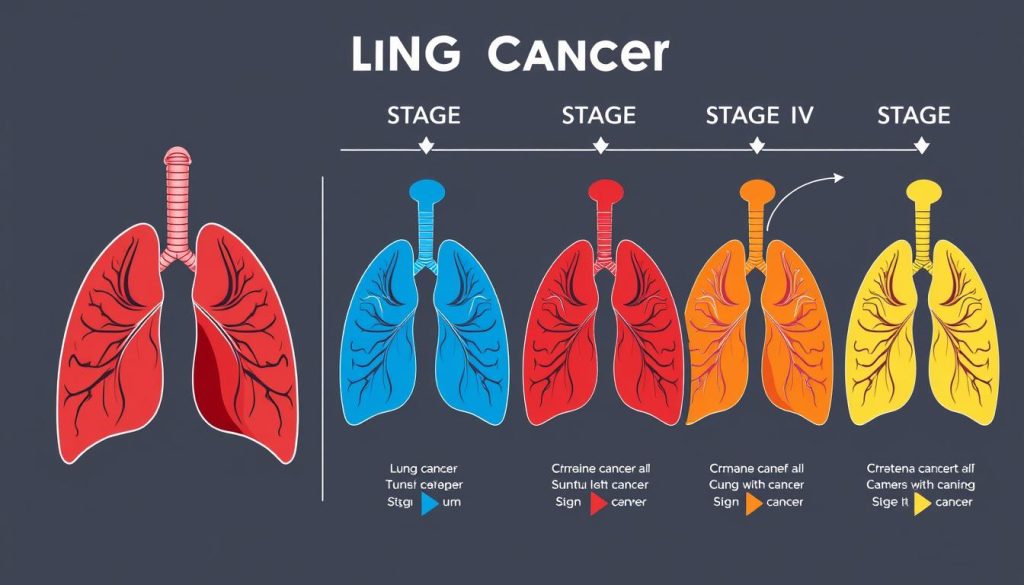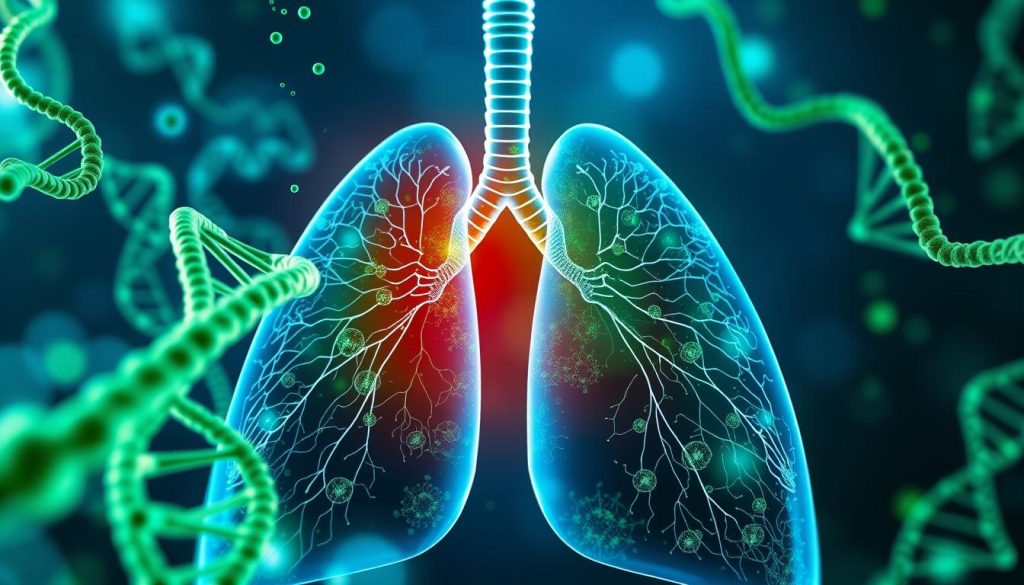Lung cancer is a big health problem, affecting millions around the world. Spotting early signs and symptoms is key for quick diagnosis and treatment. This guide aims to help you understand the warning signs of lung cancer. This knowledge could save lives.
Lung cancer can show up in many ways, from constant coughs to unexpected weight loss. We’ll look at these symptoms, talk about risk factors, and when to see a doctor. If you’re worried about your health or a loved one’s, knowing these signs is important.
By the end of this guide, you’ll know more about lung cancer symptoms. Remember, catching it early can lead to better treatment and outcomes.
Understanding Lung Cancer: A Comprehensive Overview
Lung cancer is a big health problem around the world. It affects millions of people, leading to a lot of research and new treatments. Let’s look at the different parts of lung cancer to understand it better.
Types of Lung Cancer
Lung cancer is divided into two main types:
- Non-small cell lung cancer (NSCLC)
- Small cell lung cancer (SCLC)
NSCLC makes up about 80-85% of cases. SCLC is the other 15-20%. Each type needs its own treatment plan.
How Lung Cancer Develops
Lung cancer starts with changes in normal cells. These changes make cells grow out of control, forming tumors. As it gets worse, cancer can spread to other parts of the body.
Global Impact and Statistics
Lung cancer has a big impact worldwide. Recent statistics show some scary numbers:
| Statistic | Value |
|---|---|
| Annual new cases worldwide | 2.2 million |
| Deaths per year | 1.8 million |
| 5-year survival rate | 20% |
These numbers highlight the need for better ways to prevent, find early, and treat lung cancer.
Early Warning Signs You Shouldn’t Ignore
Spotting lung cancer signs early can save lives. Some symptoms might seem minor, but it’s key to listen to your body. Let’s look at important signs that need doctor visits.
Respiratory Symptoms
Changes in breathing can point to lung problems. A cough that lasts over three weeks or coughing up blood is a warning. Shortness of breath during simple tasks and frequent chest infections are also signs.

Physical Changes
Unexplained weight loss is a common sign in lung cancer patients. You might see facial swelling or swollen lymph nodes in your neck. Clubbing of fingertips, where nails curve over, is another sign.
Systemic Symptoms
Lung cancer can affect your whole body. Feeling extremely tired that doesn’t get better with rest is a concern. Bone pain, like in the back or hips, and recurring infections or fevers without a clear cause also need attention.
Seeing these symptoms doesn’t mean you have lung cancer. But, if you notice any lasting changes, see a doctor right away. Early detection can greatly improve treatment results.
Common Symptoms of Lung Cancer
Spotting lung cancer symptoms early is vital for quick treatment. Some signs might seem small, but it’s important to notice any lasting changes in your health.
A persistent cough is often the first sign of lung cancer. This cough might start off mild but can get worse over time. It can last for weeks or even months. It might be dry or produce mucus, and usual remedies won’t help.
Chest pain is another common symptom. This pain can feel like a dull ache or sharp pain. It often happens when you breathe deeply, cough, or laugh. If you have ongoing chest pain, see a doctor right away.
Hemoptysis, or coughing up blood, is a serious symptom. Even a small amount of blood in your mucus is a sign to see a doctor fast. It could mean there’s a tumor in your airways.
- Shortness of breath
- Recurring respiratory infections
- Unexplained weight loss
- Fatigue
- Hoarseness
These symptoms can vary in how bad they are and how often they happen. They might also look like other health issues, making it hard to figure out what’s wrong. If you notice any symptoms that keep coming back or getting worse, get medical help right away.
Risk Factors That Increase Your Chances
Knowing about lung cancer risk factors is key to preventing and catching it early. Many things can up your chances of getting this serious disease. Let’s look at the main risk factor categories.
Lifestyle Factors
Smoking is the biggest risk for lung cancer, causing about 80% of deaths. Cigarettes have harmful chemicals that harm lung cells and cause mutations. Being around secondhand smoke also increases your risk.
Environmental Exposures
Radon is the second biggest risk for lung cancer. This gas is colorless and odorless and can get into homes through cracks. Other dangers include asbestos, air pollution, and certain work chemicals.
Genetic Predisposition
Some people are more likely to get lung cancer because of their genes. If your family has a history of lung cancer, you might have these genes. But not everyone with these genes will get lung cancer.
| Risk Factor | Estimated Risk Increase |
|---|---|
| Smoking | 15-30 times higher |
| Radon Exposure | 5-25 times higher |
| Genetic Mutations | 2-3 times higher |
By knowing these lung cancer risk factors, you can lower your risk. Quitting smoking, checking your home for radon, and talking to your doctor about your family history are good steps to take.
When to See a Doctor About Lung Cancer Symptoms
It’s important to know when to see a doctor for lung cancer symptoms. If you have symptoms that don’t go away, it’s time to get checked. This can help find and treat lung cancer early.
Here are some signs that mean you should see a doctor:
- A cough that lasts more than three weeks
- Coughing up blood or rust-colored sputum
- Chest pain that worsens with deep breathing or coughing
- Unexplained weight loss or fatigue
- Shortness of breath or wheezing
When you go to the doctor, tell them about your symptoms. They might suggest lung cancer screening tests. This depends on your risk and symptoms.
| Symptom | Duration Before Seeking Help |
|---|---|
| Persistent cough | 3+ weeks |
| Coughing up blood | Immediate |
| Chest pain | Ongoing for several days |
| Unexplained weight loss | 5% of body weight in 6-12 months |
| Shortness of breath | Persistent or worsening |
Seeing a doctor early can greatly improve lung cancer treatment. If you’re worried about symptoms, don’t wait. Get professional advice right away.
Diagnostic Procedures and Tests
Getting a lung cancer diagnosis involves several tests. Doctors use different methods to find and confirm lung cancer. This ensures a complete check-up.
Imaging Tests
CT scans are key in finding lung cancer. They take detailed x-rays of the lungs. This helps spot small tumors that regular chest x-rays might miss. PET scans can also show if cancer has spread to other parts of the body.

Biopsy Procedures
Bronchoscopy is a common way to get a biopsy. A thin, flexible tube with a camera is put through the nose or mouth. It lets doctors look at the airways and take tissue samples from any suspicious areas.
Laboratory Tests
Blood tests are vital in diagnosing lung cancer. They can find proteins or substances that show cancer cells are present. Sputum cytology checks mucus from the lungs under a microscope for cancer cells.
| Diagnostic Test | Purpose | Procedure |
|---|---|---|
| CT Scan | Detect small tumors | X-ray imaging of lung cross-sections |
| Bronchoscopy | Examine airways and collect samples | Tube insertion through nose or mouth |
| Blood Tests | Identify cancer markers | Blood sample analysis |
Treatment Options for Lung Cancer
Lung cancer treatment has changed a lot, giving patients many choices. Doctors pick the best treatment based on the cancer type, stage, and patient’s health.
Surgery is often the first choice for early-stage lung cancer. Surgeons take out the tumor and nearby tissue to get rid of all cancer cells. If surgery isn’t possible, radiation therapy is a good option. It uses high-energy beams to kill cancer cells without surgery.
Chemotherapy is a treatment that uses drugs to kill cancer cells all over the body. It’s often used with other treatments to work better. Targeted therapies are newer and focus on specific genetic changes in cancer cells. They are more precise and have fewer side effects.
| Treatment | Description | Best For |
|---|---|---|
| Surgery | Removal of tumor and surrounding tissue | Early-stage lung cancer |
| Radiation Therapy | High-energy beams to destroy cancer cells | Localized tumors, inoperable cases |
| Chemotherapy | Drugs to kill cancer cells throughout the body | Advanced or metastatic lung cancer |
| Targeted Therapy | Drugs targeting specific genetic mutations | Patients with identified genetic markers |
Immunotherapy is a new and exciting treatment. It helps the body’s immune system fight cancer cells. This treatment has shown great promise, even when used with other treatments.
Understanding Lung Cancer Stages
Lung cancer stages are key in choosing treatments and predicting outcomes. The staging process lets doctors see how far the cancer has spread. This helps them plan the best treatment.
TNM Classification System
The TNM system is the main way to stage lung cancer. It looks at three important things:
- T: Size and extent of the primary tumor
- N: Spread to nearby lymph nodes
- M: Presence of distant metastasis
These factors help divide lung cancer into four main stages:
| Stage | Description | 5-Year Survival Rate |
|---|---|---|
| I | Cancer is localized to the lung | 60-80% |
| II | Cancer has spread to nearby lymph nodes | 30-50% |
| III | Cancer has spread to distant lymph nodes or other chest structures | 15-30% |
| IV | Cancer has spread to other parts of the body | Less than 5% |

Stage-Specific Symptoms
Symptoms change with the stage of lung cancer. Early stages might not show symptoms, but advanced stages have more severe signs. Common symptoms include a persistent cough, chest pain, and shortness of breath.
As cancer gets worse, symptoms like weight loss, fatigue, and bone pain may appear. Finding lung cancer early and accurately staging it are critical. They help improve treatment outcomes and prognosis.
Prevention Strategies and Risk Reduction
Lung cancer prevention starts with understanding key risk factors and making smart lifestyle choices. By taking proactive steps, you can significantly reduce your chances of developing this serious disease.
Smoking cessation is the most critical step in lung cancer prevention. If you smoke, quitting now can dramatically lower your risk. For those who don’t smoke, avoiding secondhand smoke is equally important.
Adopting a healthy lifestyle plays a vital role in reducing lung cancer risk. This includes maintaining a balanced diet rich in fruits and vegetables, regular exercise, and limiting alcohol consumption.
- Eat a diet high in antioxidants
- Exercise regularly to boost immune function
- Limit alcohol intake to reduce overall cancer risk
Minimizing exposure to environmental carcinogens is another critical aspect of lung cancer prevention. Be aware of possible hazards in your home and workplace, such as radon gas, asbestos, and air pollution.
| Prevention Strategy | Impact on Lung Cancer Risk |
|---|---|
| Smoking Cessation | Reduces risk by up to 90% after 10-15 years |
| Regular Exercise | Lowers risk by approximately 20-30% |
| Healthy Diet | May reduce risk by 20-40% |
| Radon Mitigation | Can decrease risk by up to 50% in high-exposure areas |
By implementing these prevention strategies and embracing a healthy lifestyle, you can take control of your lung health. This way, you can significantly reduce your risk of developing lung cancer.
Living with Lung Cancer: Daily Management
Lung cancer changes your daily life. To improve your quality of life, manage your lung cancer well. Strong support and coping mechanisms are key.
Lifestyle Modifications
Changing your routine is important. Rest and gentle exercise like walking or yoga are good. Eat foods rich in fruits, vegetables, and lean proteins to help your body heal.

Support Systems
A strong support network is vital. Rely on family and friends for emotional and practical support. Joining support groups can help too.
These groups offer a safe space to share and learn. You can find new ways to cope with others who understand.
Coping Strategies
Find healthy ways to deal with stress and anxiety. Try deep breathing or meditation. Doing hobbies you love helps keep things normal.
Consider talking to a mental health professional for more tools. They can help you find ways to cope.
- Practice mindfulness to stay present
- Keep a journal to express your feelings
- Set small, achievable goals each day
- Celebrate milestones in your treatment journey
Remember, everyone’s lung cancer journey is different. Work with your healthcare team to make these strategies fit your needs. With the right approach, you can live well with lung cancer.
Advanced Screening Methods and Technologies
Lung cancer screening has made big strides in recent years. New tech is making it easier to catch cancer early. This is key because early detection can greatly improve treatment success.
Low-dose CT scans lead the way in lung cancer screening. They use less radiation than regular CT scans but give clear lung images. They spot small nodules that X-rays might miss.
Guidelines suggest yearly low-dose CT scans for those at high risk. This includes people aged 50-80 with a 20 pack-year smoking history. They must either smoke now or have quit in the last 15 years.
New technologies are taking early detection to new heights. Here’s a look at some exciting advancements:
| Screening Method | Description | Potential Benefits |
|---|---|---|
| Liquid Biopsy | Blood test that detects cancer DNA | Non-invasive, can detect multiple cancer types |
| AI-assisted Imaging | Uses artificial intelligence to analyze CT scans | Improved accuracy, faster results |
| Breath Analysis | Detects chemical markers in exhaled breath | Quick, non-invasive screening method |
These new screening methods are showing great promise. As research keeps going, we’ll see even more advanced tools. These will help in the battle against lung cancer.
The Role of Genetics in Lung Cancer

Genetics are key in lung cancer. Scientists found certain genetic changes linked to it. These DNA changes can happen on their own or be passed down from parents.
Only a small part of lung cancer cases are hereditary. Families with a history of lung cancer might carry genes that raise their risk. Genetic tests can spot these inherited changes.
Some common genetic changes in lung cancer include:
- EGFR mutations
- ALK rearrangements
- KRAS mutations
- ROS1 rearrangements
Genetic testing is now a big part of lung cancer care. It helps doctors figure out a person’s risk and decide on treatments. For instance, some treatments work better on tumors with certain genetic changes.
Knowing the genetic roots of lung cancer leads to new ways to prevent and treat it. Researchers are working on therapies that target specific genetic changes. This approach aims to better outcomes for lung cancer patients.
If lung cancer runs in your family, talk to your doctor about genetic testing. Early detection and action can greatly improve managing this disease.
Alternative and Complementary Therapies
Lung cancer patients often look into complementary therapies to improve their well-being. These methods are used alongside traditional treatments. They can help ease symptoms and enhance life quality.
Natural Remedies
Natural remedies can support lung cancer care. Some find relief with herbal supplements, acupuncture, or changing their diet. It’s important to talk to your healthcare team about these options. This ensures they won’t harm your main treatment plan.
Integrative Medicine Approaches
Integrative oncology mixes traditional cancer treatments with complementary therapies. This approach helps with physical, emotional, and spiritual health. Common practices include:
- Mindfulness meditation
- Yoga and tai chi
- Massage therapy
- Nutritional counseling
These therapies aim to reduce stress, manage pain, and improve well-being. They are not a replacement for medical treatment. But, they can make the patient’s experience better and possibly improve treatment results.
| Complementary Therapy | Potential Benefits | Considerations |
|---|---|---|
| Acupuncture | Pain relief, nausea reduction | Avoid if on blood thinners |
| Herbal supplements | Immune support, symptom management | May interact with medications |
| Meditation | Stress reduction, improved mood | Safe for most patients |
| Massage therapy | Pain relief, relaxation | Avoid areas of radiation treatment |
While complementary therapies can be helpful, they should not replace medical treatments. Always check with your oncologist before starting any new therapy. This ensures it’s safe and right for your situation.
Latest Research and Treatment Developments
Lung cancer research is moving fast, giving patients new hope. Scientists are looking into new treatments to help people live longer and better. Clinical trials are key in testing these new ideas.
New treatments include targeted and immunotherapies. These aim to hit cancer cells hard but leave healthy cells alone. Researchers are also working on better ways to find cancer early.
Some exciting areas of study are:
- Liquid biopsies for early diagnosis
- Personalized medicine based on genetic profiles
- Combination therapies to improve treatment efficacy
- AI-powered imaging for more accurate screening
The table below shows important lung cancer research areas:
| Research Area | Description | Potential Impact |
|---|---|---|
| Immunotherapy | Boosting the immune system to fight cancer | Longer remission periods, fewer side effects |
| Targeted Therapy | Drugs targeting specific genetic mutations | More effective treatment for specific cancer types |
| Early Detection | Advanced screening technologies | Higher survival rates through earlier diagnosis |
| Combination Therapies | Using multiple treatment methods together | Improved overall treatment effectiveness |
As research goes on, patients get more choices for personalized treatment plans. These new findings bring hope for better lives for those with lung cancer. It’s important for patients and caregivers to stay up-to-date on early signs and new treatments.
Support Resources and Patient Organizations
Lung cancer can feel overwhelming, but you’re not alone. Many groups offer vital support. They provide information, guidance, and emotional support for patients and their families.
The American Lung Association and LUNGevity Foundation lead the fight against lung cancer. They offer educational resources, support groups, and helplines. These groups also fund research and advocate for better treatments.
Local support groups can be found at hospitals or community centers. They let you connect with others facing similar challenges. Online communities like Inspire and Cancer Support Community offer forums for sharing experiences and advice.
Remember, asking for help is a sign of strength. These resources are here to guide you through your journey. They offer hope and practical help every step of the way.
FAQ
Q: What are the most common symptoms of lung cancer?
A: Common symptoms of lung cancer include a cough that doesn’t go away or gets worse. You might also cough up blood, feel chest pain, or have trouble breathing. Losing weight without trying can also be a sign.
It’s key to remember these symptoms can also mean other health issues. But if they last or get worse, see a doctor.
Q: How is lung cancer diagnosed?
A: Doctors use several ways to find lung cancer. They might do chest X-rays, CT scans, or PET scans. They might also take a biopsy or do blood tests.
Your doctor will pick the best tests based on your symptoms and health history.
Q: What are the main risk factors for developing lung cancer?
A: Main risks for lung cancer include smoking and being around secondhand smoke. Exposure to radon, certain jobs, and pollution also increase risk. Family history and past radiation therapy are other factors.
Smoking is the biggest risk, but non-smokers can get lung cancer too.
Q: Can lung cancer be prevented?
A: While you can’t prevent all lung cancer, you can lower your risk. Quitting smoking is the best way to start. Avoiding secondhand smoke and radon is also important.
Protect yourself from harmful work exposures. Eating well and exercising can also help.
Q: What are the different stages of lung cancer?
A: Lung cancer is staged using the TNM system. This looks at the tumor size, lymph nodes, and if it has spread. Stages range from 0 to IV.
Each stage has its own treatment plan. Knowing the stage is key to choosing the right treatment.
Q: What treatment options are available for lung cancer?
A: Treatment for lung cancer depends on the type, stage, and your health. Options include surgery, radiation, chemotherapy, targeted therapy, and immunotherapy. Often, a mix of treatments works best.
Q: Are there any new developments in lung cancer treatment?
A: Yes, lung cancer treatment is getting better. New targeted therapies and immunotherapy drugs are being developed. Radiation therapy is also improving to protect healthy tissue.
Researchers are looking into new combinations and treatments based on your genes.
Q: How often should I get screened for lung cancer?
A: Screening for lung cancer depends on your risk. Adults with a 20 pack-year smoking history and current or recent smoking should get annual CT scans. Talk to your doctor about the right screening schedule for you.
Q: What support resources are available for lung cancer patients and their families?
A: Many resources help lung cancer patients and their families. Organizations like the American Lung Association and LUNGevity Foundation offer support. There are also local groups, online forums, and patient advocacy programs.
These resources provide emotional support, information, and help with costs. Many cancer centers also offer counseling and integrative medicine programs.

















